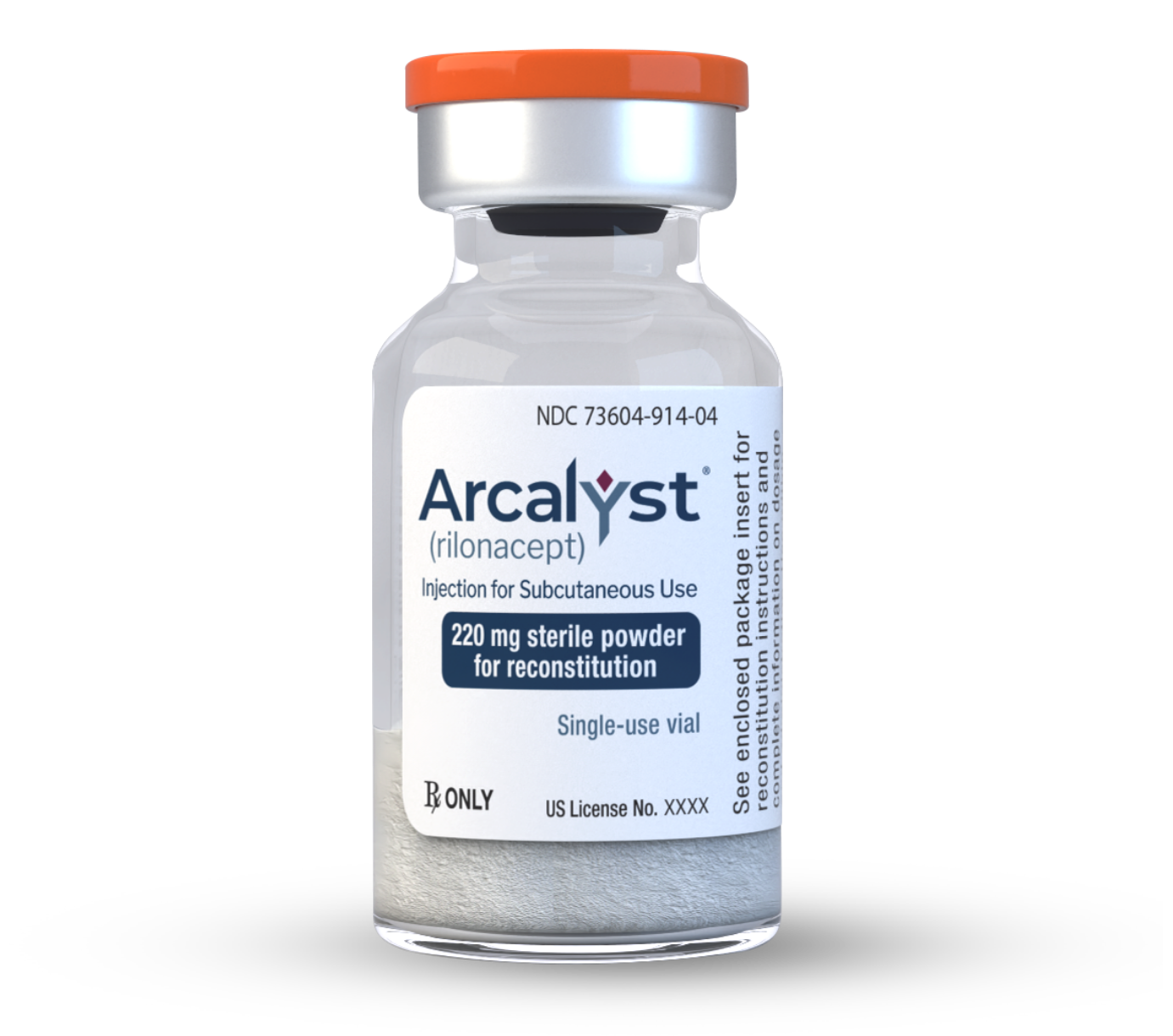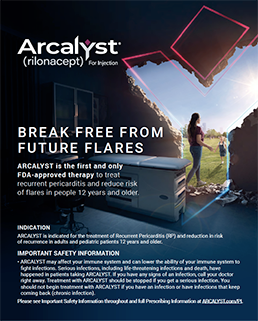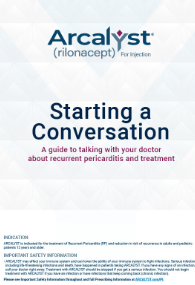Step-by-step administration
In addition to what you have learned from your healthcare provider or ARCALYST Clinical Educator, the resources below can help you better understand how to prepare and inject ARCALYST. Additional information can also be found in the Instructions for Use.
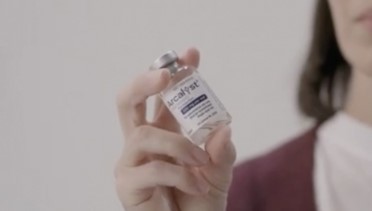
Step-by-step injection video
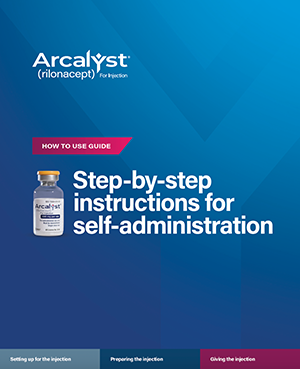
Step-by-step Instruction manual
Frequently asked questions about how to take ARCALYST
ARCALYST is a prescription medicine called an interleukin-1 (IL-1) blocker.
- ARCALYST is used to treat adults and children 12 years and older with Cryopyrin-Associated Periodic Syndromes (CAPS), including Familial Cold Autoinflammatory Syndrome (FCAS), and Muckle-Wells Syndrome (MWS)
- ARCALYST is used to maintain control of symptoms of Deficiency of Interleukin-1 Receptor Antagonist (DIRA) in adults and children weighing at least 22 pounds (10 kg)
- ARCALYST is used to treat Recurrent Pericarditis (RP) and reduce the risk of recurrence in adults and children 12 years and older
It is not known if ARCALYST is safe and effective in children under 12 years of age. It is not known if ARCALYST is safe and effective in children with DIRA weighing less than 22 pounds (10 kg).
Your Kiniksa OneConnect™ Patient Access Lead will help you coordinate the delivery of your medication and supplies. You can contact a Kiniksa OneConnect™ team member at 1-833-KINIKSA (1-833-546-4572) Monday-Friday (8 AM – 8 PM ET).
The Kiniksa OneConnect™ program is made up of a team of dedicated Patient Access Leads who provide personalized one-on-one support at each step of your treatment journey with ARCALYST. You can find services to help you with starting treatment, financial assistance, and treatment support. You can contact a Kiniksa OneConnect™ team member at 1-833-KINIKSA (1-833-546-4572) Monday-Friday (8 AM – 8 PM ET).
ARCALYST Clinical Educators are qualified personnel who can assist you with virtual or in-person training to help you better understand the self-injection process.
Your first dose of ARCALYST (referred to as the loading dose) will be given as 2 injections of ARCALYST with the help of a healthcare provider in their office or with support from an ARCALYST Clinical Educator.
The loading dose is twice the dose of the following, once-weekly “maintenance doses” that you will prepare and self-administer.
SC, subcutaneous.
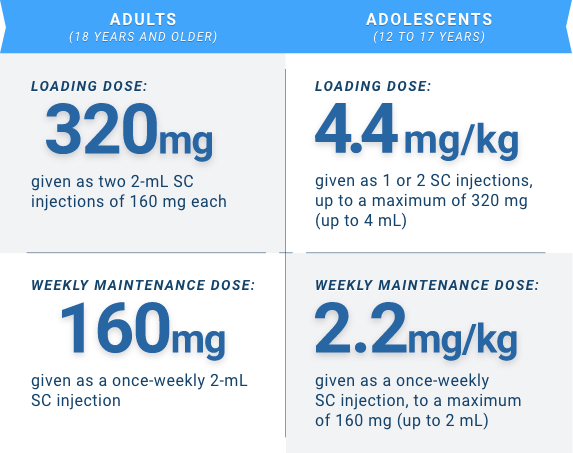
Take ARCALYST exactly as prescribed by your healthcare provider.
ARCALYST is given by injection under the skin (subcutaneous injection) 1 time each week. A healthcare provider will tell you how much ARCALYST to take. The Kiniksa OneConnect™ program can work with you to set up one-on-one injection training sessions with an ARCALYST Clinical Educator, so you are familiar with the administration process. Do not try to give yourself ARCALYST injections until you are sure that you understand how to prepare and inject your dose. Call your healthcare provider, pharmacist, or your Kiniksa OneConnect™ Patient Access Lead at 1-833-KINIKSA (1-833-546-4572) if you have any questions.
Other resources include the Step-by-Step Injection video, the Step-by-Step Injection Manual, and the ARCALYST Instructions for Use.
ARCALYST is a once-weekly, self-administered medication given by injection under the skin (subcutaneous).
Keep ARCALYST in the carton it comes in to protect it from light. Store ARCALYST in the refrigerator between 36 °F and 46 °F (2 °C and 8 °C). Refrigerated ARCALYST can be used until the expiration date printed on the vial and carton. ARCALYST may be kept at room temperature after mixing with sterile water for injection and should be used within 3 hours of mixing.
Keep ARCALYST away from light, and keep ARCALYST, injection supplies, and all other medicines out of the reach of children.
If you miss a dose, you should speak with your healthcare provider. For more information, please see the full Prescribing Information.
It is normal for the powder in the ARCALYST vial to appear as a solid clump or disc. If this is observed, continue following the steps related to the reconstitution of ARCALYST as outlined in the Instructions for Use. You may need to shake the vial back and forth for an extended period of time (repeat step 25 in the Instructions for Use) until the powder has completely dissolved and the solution is clear.
ARCALYST should be stored in the refrigerator between 36 °F and 46 °F (2 °C and 8 °C) until it is time to prepare the product for your dose.
If you receive your ARCALYST and the product feels warm to the touch or the temperature monitor inside the shipping container has been activated, please contact your Patient Access Lead who can provide guidance on the use of the product.
Talk to your healthcare provider if you experience any side effects that bother you or that do not go away. Please report side effects by contacting Kiniksa Pharmaceuticals toll-free at 1-833-546-4572, Option 3, or contact FDA at 1-800-FDA-1088 or www.fda.gov/medwatch.
ARCALYST can cause serious side effects, including:
Serious side effects:
- Serious Infections. ARCALYST can affect your immune system. ARCALYST can lower the ability of your immune system to fight infections. Serious infections, including life-threatening infections and death, have happened in people taking ARCALYST. Taking ARCALYST can make you more likely to get infections, including life-threatening serious infections, or may make any infection that you have worse.
- Risk of Cancer. Medicines that affect the immune system may increase the risk of getting cancer.
- Allergic Reaction. Stop taking or giving ARCALYST and call the healthcare provider or get emergency care right away if you get any of the following symptoms of an allergic reaction while taking ARCALYST:
- Rash
- Swollen face
- Trouble breathing
- Changes in your blood cholesterol and triglycerides (lipids). Your healthcare provider will do blood tests to check for these changes.
Common side effects:
- In people with CAPS and RP, the most common side effects of ARCALYST include:
- Injection-site reactions including: pain, redness, swelling, itching, bruising, lumps, inflammation, skin rash, blisters, warmth, and bleeding at the injection site.
- Upper respiratory tract infections
- Joint and muscle aches in RP
- In people with DIRA, the most common side effects of ARCALYST include:
- Upper respiratory tract infections
- Rash
- Ear infection
- Sore throat
- Runny nose
These are not all the possible side effects of ARCALYST. Tell your healthcare provider if you have any side effect that bothers you or does not go away. For more information, ask your healthcare provider or pharmacist.
ARCALYST is a prescription medicine called an interleukin-1 (IL-1) blocker.
- ARCALYST is used to treat adults and children 12 years and older with Cryopyrin-Associated Periodic Syndromes (CAPS), including Familial Cold Autoinflammatory Syndrome (FCAS), and Muckle-Wells Syndrome (MWS)
- ARCALYST is used to maintain control of symptoms of Deficiency of Interleukin-1 Receptor Antagonist (DIRA) in adults and children weighing at least 22 pounds (10 kg)
- ARCALYST is used to treat Recurrent Pericarditis (RP) and reduce the risk of recurrence in adults and children 12 years and older
It is not known if ARCALYST is safe and effective in children under 12 years of age. It is not known if ARCALYST is safe and effective in children with DIRA weighing less than 22 pounds (10 kg).
Your Kiniksa OneConnect™ Patient Access Lead will help you coordinate the delivery of your medication and supplies. You can contact a Kiniksa OneConnect™ team member at 1-833-KINIKSA (1-833-546-4572) Monday-Friday (8 AM – 8 PM ET).
The Kiniksa OneConnect™ program is made up of a team of dedicated Patient Access Leads who provide personalized one-on-one support at each step of your treatment journey with ARCALYST. You can find services to help you with starting treatment, financial assistance, and treatment support. You can contact a Kiniksa OneConnect™ team member at 1-833-KINIKSA (1-833-546-4572) Monday-Friday (8 AM – 8 PM ET).
ARCALYST Clinical Educators are qualified personnel who can assist you with virtual or in-person training to help you better understand the self-injection process.
Your first dose of ARCALYST (referred to as the loading dose) will be given as 2 injections of ARCALYST with the help of a healthcare provider in their office or with support from an ARCALYST Clinical Educator.
The loading dose is twice the dose of the following, once-weekly “maintenance doses” that you will prepare and self-administer.
SC, subcutaneous.

Take ARCALYST exactly as prescribed by your healthcare provider.
ARCALYST is given by injection under the skin (subcutaneous injection) 1 time each week. A healthcare provider will tell you how much ARCALYST to take. The Kiniksa OneConnect™ program can work with you to set up one-on-one injection training sessions with an ARCALYST Clinical Educator, so you are familiar with the administration process. Do not try to give yourself ARCALYST injections until you are sure that you understand how to prepare and inject your dose. Call your healthcare provider, pharmacist, or your Kiniksa OneConnect™ Patient Access Lead at 1-833-KINIKSA (1-833-546-4572) if you have any questions.
Other resources include the Step-by-Step Injection video, the Step-by-Step Injection Manual, and the ARCALYST Instructions for Use.
ARCALYST is a once-weekly, self-administered medication given by injection under the skin (subcutaneous).
Keep ARCALYST in the carton it comes in to protect it from light. Store ARCALYST in the refrigerator between 36 °F and 46 °F (2 °C and 8 °C). Refrigerated ARCALYST can be used until the expiration date printed on the vial and carton. ARCALYST may be kept at room temperature after mixing with sterile water for injection and should be used within 3 hours of mixing.
Keep ARCALYST away from light, and keep ARCALYST, injection supplies, and all other medicines out of the reach of children.
If you miss a dose, you should speak with your healthcare provider. For more information, please see the full Prescribing Information.
It is normal for the powder in the ARCALYST vial to appear as a solid clump or disc. If this is observed, continue following the steps related to the reconstitution of ARCALYST as outlined in the Instructions for Use. You may need to shake the vial back and forth for an extended period of time (repeat step 25 in the Instructions for Use) until the powder has completely dissolved and the solution is clear.
ARCALYST should be stored in the refrigerator between 36 °F and 46 °F (2 °C and 8 °C) until it is time to prepare the product for your dose.
If you receive your ARCALYST and the product feels warm to the touch or the temperature monitor inside the shipping container has been activated, please contact your Patient Access Lead who can provide guidance on the use of the product.
Talk to your healthcare provider if you experience any side effects that bother you or that do not go away. Please report side effects by contacting Kiniksa Pharmaceuticals toll-free at 1-833-546-4572, Option 3, or contact FDA at 1-800-FDA-1088 or www.fda.gov/medwatch.
ARCALYST can cause serious side effects, including:
Serious side effects:
- Serious Infections. ARCALYST can affect your immune system. ARCALYST can lower the ability of your immune system to fight infections. Serious infections, including life-threatening infections and death, have happened in people taking ARCALYST. Taking ARCALYST can make you more likely to get infections, including life-threatening serious infections, or may make any infection that you have worse.
- Risk of Cancer. Medicines that affect the immune system may increase the risk of getting cancer.
- Allergic Reaction. Stop taking or giving ARCALYST and call the healthcare provider or get emergency care right away if you get any of the following symptoms of an allergic reaction while taking ARCALYST:
- Rash
- Swollen face
- Trouble breathing
- Changes in your blood cholesterol and triglycerides (lipids). Your healthcare provider will do blood tests to check for these changes.
Common side effects:
- In people with CAPS and RP, the most common side effects of ARCALYST include:
- Injection-site reactions including: pain, redness, swelling, itching, bruising, lumps, inflammation, skin rash, blisters, warmth, and bleeding at the injection site.
- Upper respiratory tract infections
- Joint and muscle aches in RP
- In people with DIRA, the most common side effects of ARCALYST include:
- Upper respiratory tract infections
- Rash
- Ear infection
- Sore throat
- Runny nose
These are not all the possible side effects of ARCALYST. Tell your healthcare provider if you have any side effect that bothers you or does not go away. For more information, ask your healthcare provider or pharmacist.
Make sure to keep taking ARCALYST as instructed by your healthcare provider.
ARCALYST not only treats recurrent pericarditis flares as they happen, it also effectively reduces the risk of having more flares in the future. So even if your symptoms are under control, make sure to continue taking ARCALYST as your healthcare provider has instructed to help keep it that way.

